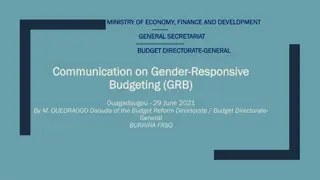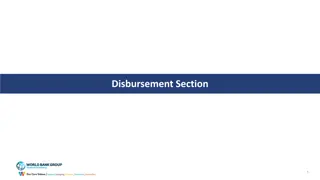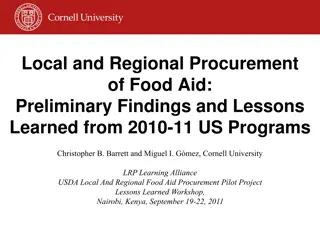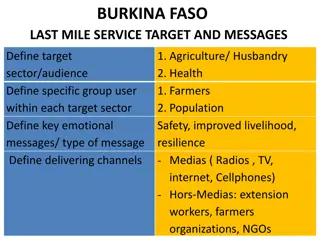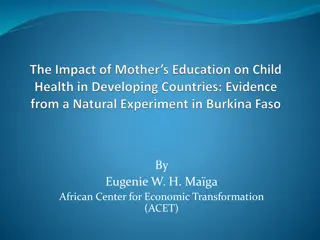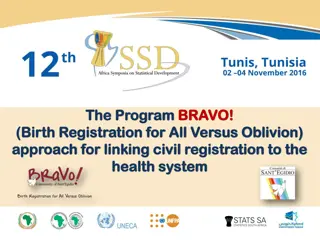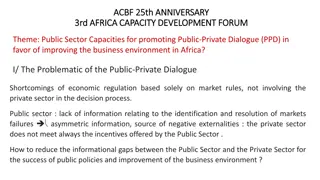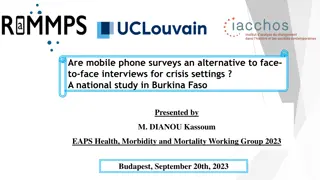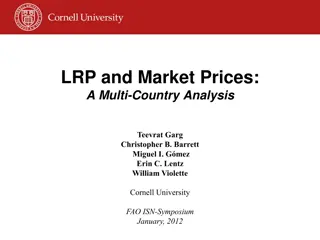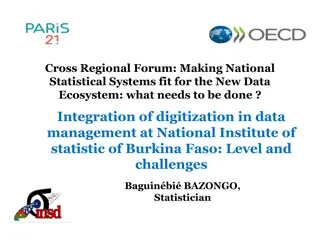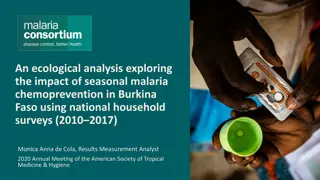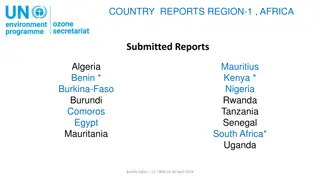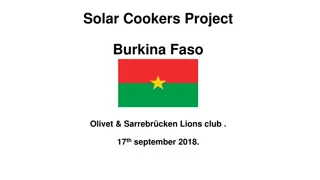Gender Integration in Burkina Faso's Long-Term Low Emissions Development Strategy
The transition to a green economy necessitates inclusive strategies that address gender disparities to ensure women can benefit from new opportunities. Policy interventions outlined by UN Women and the African Development Bank focus on promoting gender equality, reskilling strategies, green finance,
1 views • 10 slides
Gender-Responsive Budgeting Approach in Burkina Faso
Gender-responsive budgeting (GRB) initiatives in Burkina Faso focus on addressing inequalities and disparities between men and women to achieve greater social justice and equitable development. The country's commitment to reducing gender inequalities is highlighted through various efforts by the Min
0 views • 15 slides
Disbursement Overview of World Bank Projects
This document provides detailed information on disbursement sections, important documents, financing agreements, and an overview of World Bank projects in countries like Guinea, Djibouti, Ghana, Senegal, Burkina Faso, Togo, Niger, Gambia, and Benin. It covers loan amounts, implementing agencies, pro
0 views • 14 slides
Preliminary Findings & Lessons on Local and Regional Food Aid Procurement
This document presents the preliminary findings and lessons learned from local and regional procurement of food aid programs conducted by various organizations in different countries. The focus is on establishing a framework for monitoring and evaluating the performance of food aid procurement proje
0 views • 27 slides
Empowering Burkina Faso Through Last-Mile Services for Agriculture and Health Sectors
This comprehensive plan focuses on delivering last-mile services to the agriculture and health sectors in Burkina Faso. Targeting farmers and the population, the initiative aims to improve livelihoods, safety, and resilience. Key messages promoting these services are conveyed through various channel
0 views • 4 slides
Examining the Impact of Maternal Education on Child Health in Burkina Faso
Research focuses on child health outcomes in Burkina Faso, exploring the link between maternal education and child well-being. It addresses the prevalence rates of stunting, school enrollment, and education policies in the country. Objectives include studying causal relationships and potential thres
0 views • 32 slides
BRAVO! Birth Registration Impact Evaluation Study in Burkina Faso
BRAVO! (Birth Registration for All Versus Oblivion) is a program collaborating with governments in Burkina Faso, Malawi, and Mozambique to link civil registration to health systems. The impact evaluation study in Burkina Faso's Sangui province shows the positive effects of opening stable registratio
0 views • 10 slides
Enhancing Public-Private Dialogue for Development in Africa
Addressing the shortcomings in public-private dialogue can lead to improved business environments in Africa. The challenges include information gaps, lack of involvement of the private sector in decision-making, and issues with economic regulation. Successful examples like the Cameroon Business Foru
0 views • 5 slides
Are Mobile Phone Surveys an Alternative to Face-to-Face Interviews in Crisis Settings? A National Study in Burkina Faso
Vital registration data source completeness remains low in many countries, prompting the exploration of alternative data collection methods like mobile phone surveys (MPS). MPS have advantages such as cost-effectiveness and quick deployment but face challenges like network quality. This study in Bur
0 views • 13 slides
Analyzing Local Procurement and Market Prices Across Multiple Countries
The study delves into the effects of local procurement on market prices and price volatility across various countries. It explores the motivations behind studying price effects, the impact of procurement and distribution on prices, and the scope of the analysis focusing on retail prices. The identif
0 views • 15 slides
Enhancing Data Digitization at National Statistical Systems - A Case Study of Burkina Faso
National Institute of Statistics in Burkina Faso, established in 1974, faces challenges in integrating digitization for data collection and dissemination. With a staff of 257, including 167 statisticians-demographers and 4 IT professionals, the level of digitization is progressing but faces hurdles
0 views • 12 slides
Impact of Seasonal Malaria Chemoprevention in Burkina Faso
Exploring the impact of seasonal malaria chemoprevention (SMC) in Burkina Faso using national household surveys. SMC involves administering anti-malaria medication to children during peak transmission seasons to prevent malaria episodes. The study investigates the effectiveness of SMC delivery, cove
0 views • 12 slides
Implementation of IPTg-c Approach in Burkina Faso
In Burkina Faso, the IPTg-c approach has shown significant progress in preventing malaria during pregnancy, with coverage increasing from 22% in 2014 to 76.05% in 2020. The initiative involves community-based health workers, training stakeholders, and engaging target communities through advocacy. WH
0 views • 15 slides
Ozone Observational and Monitoring Activities in Algeria and Burkina Faso
Algeria's National Meteorology Office conducts ozone monitoring at GAW stations in Tamanrasset City and Assekrem. Calibration and data reporting are done regularly to WOUDC. In Burkina Faso, NAMA-BF oversees meteorological observations and is acquiring instruments for ozone monitoring. Collaboration
0 views • 20 slides
Solar Cookers Project in Burkina Faso: Empowering Communities with Renewable Energy
The Solar Cookers Project in Burkina Faso, initiated by the Lions Club of Olivet and Sarrebrücken, aims to address the environmental and social challenges caused by wood consumption for cooking. By introducing solar cookers, the project seeks to provide a sustainable solution that reduces wood depe
0 views • 27 slides

